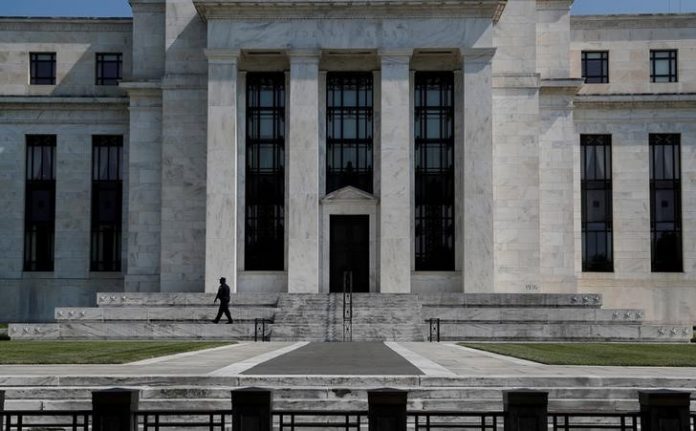The Federal Reserve is about to get serious. It’s expected to announce a faster phase-out of its bond purchases later, paving the way for an earlier start to a new rate hike cycle next year. The Bank of England is also expected to move this week after inflation in the U.K. surged in November. China’s economy sputters as more anecdotal news points to wider trouble in its property sector. And oil prices fall below $70 on fears that Omicron-variant Covid-19 will lead to more demand-sapping lockdowns. Here’s what you need to know in financial markets on Wednesday, 15th December.
1. You-know-what
There’s a central bank meeting going on that you may have heard about. It ends at 2 PM ET (1900 GMT) and its chairman comes out to talk about its conclusions and the outlook for next year at 2:30 PM.
Market consensus suggests the Federal Reserve will look to wrap up its bond-buying by March, as implied by Chairman Jerome Powell’s testimony to Congress last week. That would pave the way for a first interest rate hike around the middle of the year, with time for one or two more by the end of 2022. As ever, the ‘dot-plot’ of policymakers’ expectations for rates over the next two years will be important.
The meeting takes place against the backdrop of a 39-year high in consumer inflation and a decade high in producer price inflation, neither of which has showed much sign of slowing down in the last month.
2. China wobbles again
China’s economy continues to sputter, against the backdrop of its ongoing real estate crisis and the arrival of Omicron-variant Covid-19 in the country.
Investment in fixed assets, a data series dominated by the property sector, grew at its slowest in nearly two years in November, rising only 5.2%. More importantly perhaps, it was the sixth straight month that growth had been slower than forecast. Sentiment in the real estate sector has been shaken in the last two days as Shimao Group – widely seen as one of the industry’s stronger players – was forced to inject funds into one of its weaker units.
Additionally, offshore bondholders of Kaisa are in talks to buy some of the group’s bad loans on the mainland in search of better access to information on how the restructuring process is being conducted.
Industrial production in China rose slightly more than expected but retail sales growth fell short, again.
3. Stocks flat ahead of Fed. Trump media company in focus
U.S. stocks are predictably flat ahead of the open, with few people willing to take new positions ahead of the Fed meeting and press conference.
By 6:20 AM ET, Dow Jones futures were up 15 points, essentially unchanged from the previous session’s close, as were S&P 500 futures. Nasdaq 100 futures fell another 0.2%. All three indicates had posted losses on Tuesday after U.S. producer price data reinforced expectations of Fed policy tightening.
Stocks likely to be in focus later include Digital World Acquisition Corp (NASDAQ:DWAC), the SPAC which is merging with Donald Trump’s new media company. Trump Media earlier signed a partnership agreement with Canadian-based Rumble.
Lennar (NYSE:LEN), REV Group (NYSE:REVG) and ABM (NYSE:ABM) are all due to report earnings before the open.
4. U.K. CPI surge puts rate hike back on the cards
Traders flip-flopped yet again on their expectations for the Bank of England’s policy meeting on Thursday after inflation data for November showed the annual CPI surging 5.1%, well above forecast. The Bank’s senior figures hadn’t expected it to hit 5% until April, when a hike in regulated household energy prices takes effect.
As in the U.S., producer price inflation data also came in above forecasts. Short-term interest rate futures now price in a 70% probability of a 15 basis point rate hike on Thursday.
That all puts the BoE in an awkward position. Officials had indicated they would want to see how the spread of Omicron-variant Covid-19 hits the economy before pulling the trigger on rates. The U.K.’s health authorities suspect that Omicron is spreading through the population at an unprecedented rate, although there has been no noticeable surge in hospital admissions so far.
5. Oil slumps as API, Omicron stoke demand fears
Crude oil prices fell sharply on fears that the spread of Omicron will force governments to clamp down harder on economic and social life, stifling demand just at a time when the global market is already tipping back into surplus.
The U.S. government will release its weekly inventory data at 10:30 AM ET, after the American Petroleum Institute’s figures showed a smaller than expected drop in stockpiles for both crude and refined products.
Investing.com




